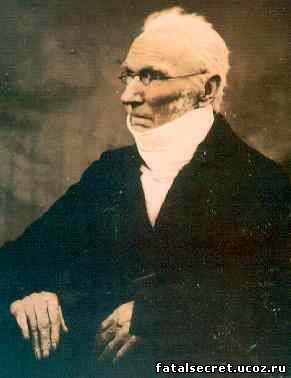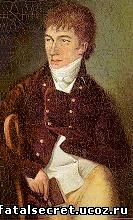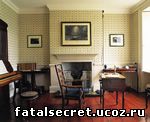Rev. Patrick Brontё


Father of the novelists, Charlotte, Emily and Anne Brontё. Born Emdale, County Down, 17th March 1777.
Died Haworth, Yorkshire, 7th June 1861.
Died Haworth, Yorkshire, 7th June 1861.
Background
Patrick was the eldest of 10 children of Hugh Brunty, an agricultural labourer, and Eleanor (a.k.a. Alice) McClory, of Drumballyroney, County Down, Northern Ireland. He was apprenticed to a blacksmith and then to a linen weaver, but by sixteen, he was Master of the village school. At first self-educated, he was later helped by local clergymen, Revs. Andrew Harshaw and Thomas Tighe. He entered St. John's College, Cambridge in 1802, where he adopted the name Brontë (Greek for thunder). He graduated in 1806 and paid a visit to his family in Northern Ireland. He returned to England and never visited Ireland again.
Patrick was the eldest of 10 children of Hugh Brunty, an agricultural labourer, and Eleanor (a.k.a. Alice) McClory, of Drumballyroney, County Down, Northern Ireland. He was apprenticed to a blacksmith and then to a linen weaver, but by sixteen, he was Master of the village school. At first self-educated, he was later helped by local clergymen, Revs. Andrew Harshaw and Thomas Tighe. He entered St. John's College, Cambridge in 1802, where he adopted the name Brontë (Greek for thunder). He graduated in 1806 and paid a visit to his family in Northern Ireland. He returned to England and never visited Ireland again.
Career
He was ordained into the Church of England in 1807 and held curacies at: Wethersfield, Essex (1807), Wellington, Shropshire (1808), Dewsbury, Yorkshire (1809), Hartshead, Yorkshire (1810) and Thornton, Yorkshire (1815). In 1820 he was appointed Perpetual Curate of the villages of Haworth, Stanbury and Oxenhope, within the Parish of Bradford. He was an Evangelical and a popular preacher, and he held the living in Haworth for 41 years, assisted by a succession of his own curates including Arthur Bell Nicholls.
He was ordained into the Church of England in 1807 and held curacies at: Wethersfield, Essex (1807), Wellington, Shropshire (1808), Dewsbury, Yorkshire (1809), Hartshead, Yorkshire (1810) and Thornton, Yorkshire (1815). In 1820 he was appointed Perpetual Curate of the villages of Haworth, Stanbury and Oxenhope, within the Parish of Bradford. He was an Evangelical and a popular preacher, and he held the living in Haworth for 41 years, assisted by a succession of his own curates including Arthur Bell Nicholls.
Publications
Winter Evening Thoughts, (1810). Cottage Poems, (1810). The Rural Minstrel: A Miscellany of Descriptive Poems, (1813). The Cottage In The Wood, (1816). The Maid Of Killarney, (1818). The Signs Of The Times, (1835).
Winter Evening Thoughts, (1810). Cottage Poems, (1810). The Rural Minstrel: A Miscellany of Descriptive Poems, (1813). The Cottage In The Wood, (1816). The Maid Of Killarney, (1818). The Signs Of The Times, (1835).

Reverand Brontё's Study
Family
He married Maria Branwell at Guiseley Parish Church, Yorkshire on the 29th December 1812. They had one son and five daughters: Maria (1814), Elizabeth (1815), Charlotte (1816), Patrick Branwell (1817), Emily Jane (1818) and Anne (1820). The family moved into Haworth Parsonage in 1820. Maria Brontë died from cancer (probably of the uterus) in 1821, when her sister, Elizabeth Branwell, came to live at the Parsonage to look after the children. She remained at the Parsonage until her own death in 1842. In 1823 Maria Jnr., Elizabeth, Charlotte and Emily were sent to the Clergy Daughters' School, Cowan Bridge, forty miles north of Haworth. During their second year at the school, Maria and Elizabeth contracted tuberculosis and died soon after returning home. In 1848 Branwell and Emily also died of tuberculosis, as did Anne the following year. Charlotte died in the early stages of pregnancy in 1855. Mr. Brontë never re-married; he outlived all his children, and he has no direct descendants.
Family
He married Maria Branwell at Guiseley Parish Church, Yorkshire on the 29th December 1812. They had one son and five daughters: Maria (1814), Elizabeth (1815), Charlotte (1816), Patrick Branwell (1817), Emily Jane (1818) and Anne (1820). The family moved into Haworth Parsonage in 1820. Maria Brontë died from cancer (probably of the uterus) in 1821, when her sister, Elizabeth Branwell, came to live at the Parsonage to look after the children. She remained at the Parsonage until her own death in 1842. In 1823 Maria Jnr., Elizabeth, Charlotte and Emily were sent to the Clergy Daughters' School, Cowan Bridge, forty miles north of Haworth. During their second year at the school, Maria and Elizabeth contracted tuberculosis and died soon after returning home. In 1848 Branwell and Emily also died of tuberculosis, as did Anne the following year. Charlotte died in the early stages of pregnancy in 1855. Mr. Brontë never re-married; he outlived all his children, and he has no direct descendants.

Reverand Brontё's Desk with magnifying glass
Disposition and Health
Patrick Bronte was tall and slim with red hair. A Tory, he was an energetic campaigner on a wide range of religious, social and political issues. He was a tolerant and attentive father. After the Cowan Bridge disaster, he took charge personally of the education of his children, but a long life marked by a succession of family tragedies turned a socially engaged man in his forties, into the dour and reclusive septuagenarian described in Elizabeth Gaskell's The Life of Charlotte Brontë (1857). His eyesight deteriorated in his 60s and 70s and he had a cataract removed in 1846. He suffered from dyspepsia and bronchitis all his adult life, both conditions contributing to his death at the age of 84.
Disposition and Health
Patrick Bronte was tall and slim with red hair. A Tory, he was an energetic campaigner on a wide range of religious, social and political issues. He was a tolerant and attentive father. After the Cowan Bridge disaster, he took charge personally of the education of his children, but a long life marked by a succession of family tragedies turned a socially engaged man in his forties, into the dour and reclusive septuagenarian described in Elizabeth Gaskell's The Life of Charlotte Brontë (1857). His eyesight deteriorated in his 60s and 70s and he had a cataract removed in 1846. He suffered from dyspepsia and bronchitis all his adult life, both conditions contributing to his death at the age of 84.

Reverand Brontё's Bedroom
Источник:



